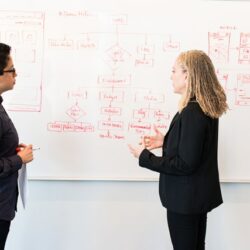Business systems are what keep your business working and growing. Having a set of clear instructions and processes to follow can make all the difference to the people working in your team. Newcomers to your business should be able to follow well-established steps, laid down before them.
Research shows that 25% of companies have repeatable processes that are not documented. 6% of companies have processes that are best described as accidental. If things are just kind of happening in your business accidentally, you’re going to run into trouble. Business systems are essential and should be set down and followed.

“For a business to survive and thrive, 100% of all the systems must be functioning and accountable.” Robert Kiyosaki
So today we will be looking at the six key stages every business needs to move through to experience sustainable success with their systems. These steps are the only way to stay ahead of the game as your team grows and your business expands.
Space
The first thing you need to set you up for business systems success is one single dedicated space. You might choose Dropbox or OneDrive, or Google Drive, which is my favourite. Whichever you choose, set up that online space. You only need one online platform … not several spaces for different things. Having multiple online workspaces will only create confusion and chaos. It always needs to be in the cloud, so it’s accessible from anywhere and protected well.
Structure
Once you have set up that one dedicated business space online you need to then focus on organising a simple structure. Set up a system of folders that is so simple that anyone could use it. Keep to the limit of no more than 10 folders. Organise it so all your resources can be easily found and utilised by you and your growing remote team. No need to overcomplicate this organisational business structure. Keep the overall framework simple.
Sequence
Inside the broad structure, you will need to start breaking down your everyday processes and routines into task sequences. These are the main workflows in your business systems. Focus on mapping out all the processes you and your team use to manage the work in your business marketing, client care, accounting, and so on. Build those out in a chart so everyone can have clarity and understanding of the workflows.
Steps
Next, you’re going to write up each step that each member of the team follows to conduct their everyday work. These work instructions constitute the day-to-day foundation of your business systems. They help to make sure your people know how to do each of the tasks in those workflows. Once you have made them up in videos or written steps, they will live inside the main filing structure you have already built.
Start
Once you’ve got a few things set up you and your remote team need to dedicate yourself to start using them. You all need to rehash the way that you do your work each day. Adapt your daily routines and methods of working to rely more heavily on the systems you have set up. Follow all the new steps, rather than just continuing with your accidental processes.
Sustain
The final part of the journey towards sustainable business systems is to sustain it all. To keep your business systems running beautifully, you need to keep your documented systems and processes up to date. Maintain the new steps that you’ve written up. Make sure people know how to follow each of the steps. Support them when they come off the rails, and reward them when they do well. Make sure the people working for you remotely know they are valued and appreciated.
I hope this has been helpful for you to set up your systems. A strong set of business systems are often overlooked, yet they are essential for growing and scaling your business.






